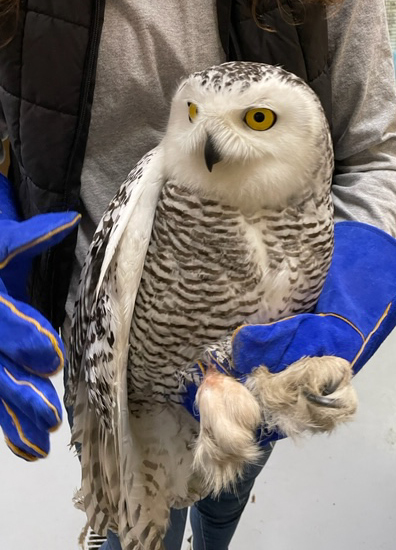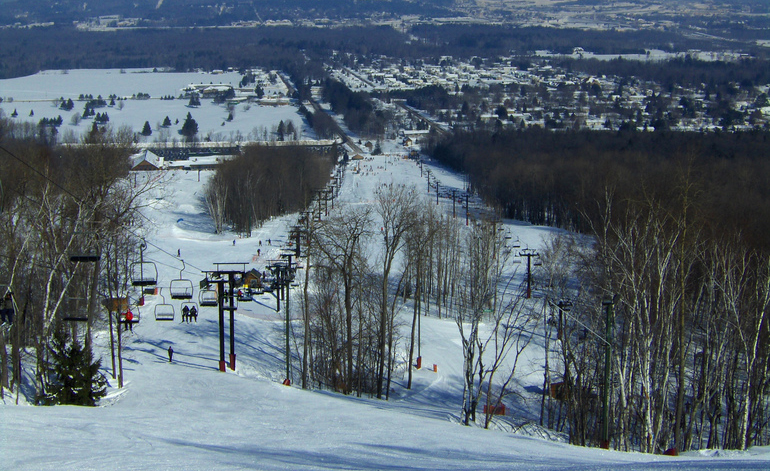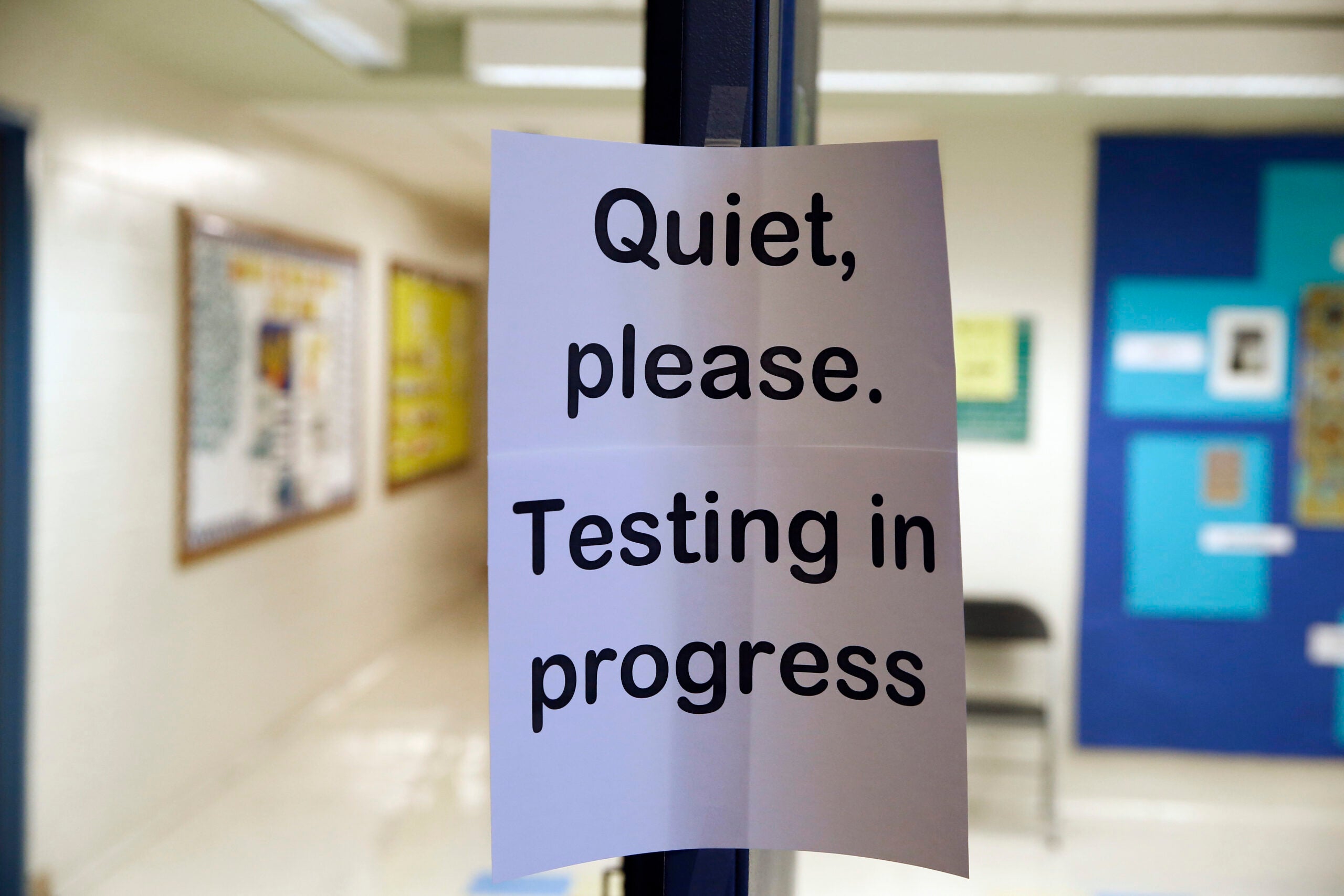Wisconsin is known for its winters. But with climate change, that may be waning.
Changes in weather patterns have particularly affected winter sports — skiing, snow shoeing, ice fishing and snowboarding among others.
“But what would it mean for the state’s economy and recreation — and to some extent, its ethos — if we get less snow and cold?” asks the Milwaukee Journal Sentinel.
News with a little more humanity
WPR’s “Wisconsin Today” newsletter keeps you connected to the state you love without feeling overwhelmed. No paywall. No agenda. No corporate filter.
According to research by the University of Maryland’s Center for Environmental Science, in 60 years, Wisconsin’s climate will resemble more closely the current states of Ohio, northern Kansas or southern Pennsylvania.
Winters have gotten warmer throughout the last century, and that rate is set to continue more rapidly, indicates data from the Wisconsin Initiative on Climate Change Impacts, which is most widely collected from Wisconsin’s lakes and their ice patterns. The University of Wisconsin-Madison’s Center for Climatic Research has found that lakes have ice cover for about a month less now than they did when the records began about 170 years ago. And not only is the ice cover lasting for shorter periods of time, but research shows the quantity of ice cover is less.
The changes in Wisconsin lakes then cause ripple effects in the economy, as winter sporting businesses and surrounding bars or restaurants take a hit. And the fishing industry suffers as the lakes cannot sustain the fish in the same ways.
Long-term studies also show that with less snow comes more rain. The state’s skiing industry has had to adjust, with some switching from an emphasis on skiing to winter biking, or “fat biking.” Companies also have to invest more money and resources in snowmaking.
“We’re super tied to climate change and people’s reactions to it. We see it in our revenue every year,” said Joe Vadeboncouer, chief operating officer of The Birkie, the longest cross-country ski marathon in North America.
Wisconsin DHS: COVID-19 Weekly Recap
The seven-day average for new COVID-19 cases in Wisconsin is 4,147 as of Friday. The Wisconsin Department of Health Services has confirmed 11,334 total deaths from the disease.
As of Friday, 59.5 percent of Wisconsinites are fully vaccinated — 82.2 percent of people age 65 and older, 55.2 percent of children age 12 to 17 and 20.6 percent of children 5 to 11 years old.
On Tuesday, Pfizer-BioNTech filed a submission for emergency use authorization to the Food and Drug Administration to begin vaccines for children ages six months to five years. The FDA plans to meet on Feb. 15 to discuss the request, which would open eligibility to the vaccine to the last remaining population currently unable to get vaccinated.
Eau Claire could be next city to welcome Afghan refugees
A new group in Eau Claire is hoping to offer a helping hand and some Wisconsin hospitality to three to five Afghan refugee families now housed at Fort McCoy.
Welcoming New Neighbors-NW WI Refugee Resettlement is currently working to get federal approval to resettle the families. In the meantime, the group is seeking affordable housing, furniture and clothing to support the families for their first few months in town.
“Our plan is to line up five homes or apartments so we’re ready to welcome the families,” Ginny Close, a leader of the interfaith effort, told the Eau Claire Leader-Telegram.
Welcoming New Neighbors is also looking for volunteers to help welcome the families with meals, offer translation services and provide help with finances, transportation and employment.
“The goal is that they will be able to hit the ground running as soon as we can get them connected,” Close said. “There is an urgency to get these people out of these military bases.”
The refugees at Fort McCoy reportedly include mostly people who worked with the U.S. government in Afghanistan and others whose jobs put them at risk if they had stayed.
“They had to escape for fear for their lives,” Close said. “They did all the could to support us in helping the United States in Afghanistan and we owe them a debt for doing that.”
Agricultural land values rising
Farmland values have been on the rise across the country, and Wisconsin farmers are seeing that firsthand.
Agricultural land values in the southwestern part of the state have increased by 25 percent to 30 percent in the last year, according to The Janesville Gazette.
The state saw a 10 percent increase between October 2020 and October 2021, according to data from the Federal Reserve Bank of Chicago cited by the paper.
So what’s pushing the land values higher? Commodity prices have gone up.
Randy Hughes, a farmer and co-owner of a farm between Janesville and Beloit, told The Gazette there are other reasons: There is pressure to develop large portions of land for housing, solar farms or recreational.
School districts and their varying COVID-19 sick day policies
[[{“fid”:”1579256″,”view_mode”:”full_width”,”fields”:{“format”:”full_width”,”alignment”:””,”field_image_caption[und][0][value]”:”%3Cp%3ETeacher%20Sarah%20Hoenig%20asks%20her%20first-grade%20students%20questions%20after%20reading%20from%20a%20book%20Friday%2C%20Sept.%2017%2C%202021%2C%20at%20Hackett%20Elementary%20School%20in%20Beloit%2C%20Wis.%20%3Cem%3EAngela%20Major%2FWPR%3C%2Fem%3E%3C%2Fp%3E%0A”,”field_image_caption[und][0][format]”:”full_html”,”field_file_image_alt_text[und][0][value]”:”Students sitting on a rug raise their hands as a teacher who sits in a chair asks questions. “,”field_file_image_title_text[und][0][value]”:”Hackett Elementary School”},”type”:”media”,”field_deltas”:{“2”:{“format”:”full_width”,”alignment”:””,”field_image_caption[und][0][value]”:”%3Cp%3ETeacher%20Sarah%20Hoenig%20asks%20her%20first-grade%20students%20questions%20after%20reading%20from%20a%20book%20Friday%2C%20Sept.%2017%2C%202021%2C%20at%20Hackett%20Elementary%20School%20in%20Beloit%2C%20Wis.%20%3Cem%3EAngela%20Major%2FWPR%3C%2Fem%3E%3C%2Fp%3E%0A”,”field_image_caption[und][0][format]”:”full_html”,”field_file_image_alt_text[und][0][value]”:”Students sitting on a rug raise their hands as a teacher who sits in a chair asks questions. “,”field_file_image_title_text[und][0][value]”:”Hackett Elementary School”}},”link_text”:false,”attributes”:{“alt”:”Students sitting on a rug raise their hands as a teacher who sits in a chair asks questions. “,”title”:”Hackett Elementary School”,”class”:”media-element file-full-width”,”data-delta”:”2″}}]]Wisconsin school districts are creating sick leave policies related to COVID-19.
Numerous districts across the state have some type of COVID-19- related sick leave in addition to the existing policies for regular sick leave, according to the Milwaukee Journal Sentinel.
From March to December 2020, school districts were required through the Families First Coronavirus Response Act’s Employer Paid Leave to provide 10 sick days for COVID-19-related absences. That requirement expired after December 2020.
Other school districts don’t have sick leave specific to COVID-19, but employees can use regular sick time for it.
This story breaks down what districts in southeastern Wisconsin are doing for policies.
‘Feisty’ snowy owl found on street in Green Bay is recovering
A young snowy owl that was found in Green Bay, far outside its typical hunting area, is recovering after being found by a concerned citizen on Jan. 20, the Green Bay Press Gazette reported.
Snowy owls typically hunt for rodents in open fields and near shorelines in winter. Finding the bird in a city is “unusual,” said Lori Bankson, curator of animals at the Bay Beach Wildlife Sanctuary where the bird is getting treated for a broken wrist.

“To hear it was on Quincy Street was really surprising,” Bankson said. “Something lured her down there, whether she was following the river and then somehow came in to the east side. However she got there, it is unusual.”
The female owl underwent surgery to repair damage to her wrist, which is vital for flight. Out of surgery for less than a week, the owl was “feisty,” Bankson said, according to the Press Gazette.
R-Paws, a volunteer-run program within the Bay Beach Wildlife Sanctuary that has been caring for the animal, has seen an influx of donations to support the owl’s rehabilitation.
“People have really gotten behind this owl,” Bankson said. “So many donations have come in to help her out, and we’re so appreciative of that.”
Washington state auditors found mail-in ballots from minority voters were rejected at higher rate during 2020 election
Washington state’s evaluation of mail-in ballots from the 2020 election revealed that those cast by Black voters were tossed out four times as often as white voters, the New York Times reported.
Based on auditors’ examination, this rate means one of every 40 mail-ballot from Black people was disqualified. Officials found that “rejection rates were also elevated for Native American, Hispanic, and Asian and Pacific Islander voters,” according to the report.
State officials told the newspaper that there weren’t any signs that ballots cast by minority voters were knowingly singled out or deliberately falsified. The ballots were all rejected because of “problematic signatures,” officials said. This refers to questions about the signatures, meaning they were either missing or didn’t match those on file.
Officials said the root of this could be “voter inexperience, language problems or other factors.”
“It’s not acceptable, quite frankly,” said state auditor Pat McCarthy, whose office conducted the audit.
McCarthy urged state election officials to take steps to address the disparities, the paper reported.
Editor’s note: The Associated Press contributed to this report.
Wisconsin Public Radio, © Copyright 2026, Board of Regents of the University of Wisconsin System and Wisconsin Educational Communications Board.




